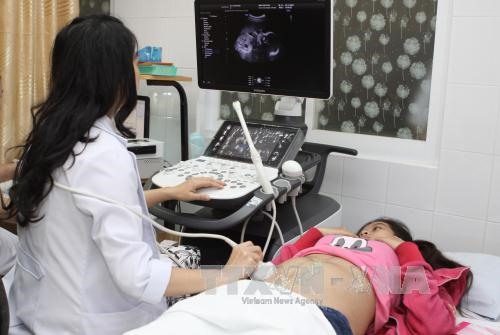 Society
Society

The HCM City People’s Committee yesterday decided to set up a steering board for Zika and dengue-fever prevention as the number of cases has increased during the rainy season, which creates favourable conditions for the breeding of mosquitoes.
 |
| Pregnant woman is screened at Từ Dũ Obestetrics Hospital, one of 45 Zika-surveillance health facilities in HCM City. —VNA/VNS Photo Phương Vy |
HCM CITY — The HCM City People’s Committee yesterday decided to set up a steering board for Zika and dengue-fever prevention as the number of cases has increased during the rainy season, which creates favourable conditions for the breeding of mosquitoes.
Zika and dengue fever are transmitted to people via the bite of an infected Aedes species mosquito.
More than 15,000 people have been diagnosed with dengue fever since the beginning of the year, an increase of 13 per cent over 2015.
As of yesterday, 21 people in the city had been tested positive for the Zika virus.
The total number of Zika incidents in the country has risen to 28 in HCM City and the six provinces of Khánh Hòa, Long An, Bình Dương, Trà Vinh, Đắk Lắk and Phú Yên.
At a meeting between the committee and government agencies yesterday, Nguyễn Thị Thu, the People’s Committee’s deputy chairwoman, told authorities at wards, communes and towns to improve environmental hygiene by clearing away waste and containers where mosquitoes and larvae can survive and breed.
“Environmental hygiene in several districts including Hóc Môn, 12 and Bình Thạnh still needs more attention. That has been one of the reasons for the increase of Zika incidences,” Thu said.
Dr Nguyễn Trí Dũng, head of the city’s Preventive Health Centre, said the city had carried out inspection for the implementation of preventive methods at localities.
But inspections showed that people still have a low awareness about preventive methods and have not co-operated with local authorities to clean the environment.
A city surveillance system of epidemics carried out by the city’s Department of Health has tested 921 suspected samples have since February. Of these, 21 tested positive for the Zika virus.
Fifty-six more samples have been taken this week, but results have yet to be released, according to Dũng.
Phan Trọng Lân, head of the city-based Pasteur Institute, explained that the number of reported incidences was high as the city’s surveillance system operated well and was able to easily identify affected areas.
HCM City has a population of more than 12 million and large number of visitors, he said.
Rapid urbanisation with many high-rises have also led to a higher density of mosquitoes.
“It is important to control the clusters of larvae and mosquitoes to reduce the risk of spread. The city’s health sector is overloaded. We have had to treat 50 dengue fever and 40 Zika outbreaks,” Lân said.
Each ward and commune-based steering committee should improve their control over their areas, he said.
Dũng said that if the surveillance system identified suspicious cases, the city would not wait until positive results were received from laboratories but would immediately report their findings to ward- and commune-level health centres. — VNS




